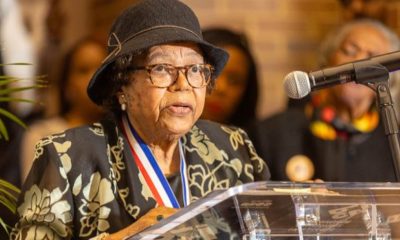#NNPA BlackPress
Rebuilding Titusville Community with $300M in Investments
BIRMINGHAM TIMES — Picture the Titusville you grew to know and love, a place with miles of land and even more potential. There’s a sense of nostalgia watching so many walk the sidewalks, possibly just as people did where you grew up. Greenery catches the eye, until it’s interrupted by the sight of a vacant lot or a vacant home. Though soulless apartment buildings occupy many spaces, a taste of what once was still lingers in the air. There’s a strong sense of history but not much to commemorate it.
By Ameera Steward
Picture the Titusville you grew to know and love, a place with miles of land and even more potential. There’s a sense of nostalgia watching so many walk the sidewalks, possibly just as people did where you grew up. Greenery catches the eye, until it’s interrupted by the sight of a vacant lot or a vacant home. Though soulless apartment buildings occupy many spaces, a taste of what once was still lingers in the air. There’s a strong sense of history but not much to commemorate it.
Now envision this same space with newfound light and life. Apartment buildings filled with love and community. A house built by generations of a family occupying a once-empty landscape. Black-owned businesses emerging from the shadows of blight and years of poverty.
Welcome to new and improved Titusville community, which is now undergoing $300 million in redevelopment that includes Atlanta, Ga.-based data center provider DC BLOX Inc. opening its flagship hub data center at the former Trinity Steel site in the historic Birmingham community.
And there’s more.
- King Manor and Montevallo Gardens along Third Avenue Southwest have merged to form the University Crossings apartment complex, which will provide safe housing for veterans and those with low incomes.
- Loveman Village—now known as the Villas at Titusville and undergoing construction by the Housing Authority of the Birmingham District (HABD)—is currently in the midst of phase one of a renovation that includes 100 units planned for completion by the fall; phase two will include 64 new units and should be complete in the summer of 2020.
- The former Center Street Middle School was purchased by Holy Family Cristo Rey Catholic High School, which is making significant upgrades to improve the facility for its students and the surrounding community.
More Diversity
Titusville, a neighborhood nestled between the University of Alabama (UAB) to the east and Elmwood Cemetery to the west, launched the careers of politicians, college presidents, prize-winning journalists, and international bankers. It was home to prominent local leaders, such as African American architect Wallace Rayfield, who designed the Sixteenth Street Baptist Church downtown Birmingham, and former U.S. Secretary of State Condoleezza Rice. It was one of the first neighborhoods in Birmingham where African Americans were allowed to own residential and commercial property.
“A lot of good things are coming to Titusville, a lot of good jobs. … No matter where you go, there will be great housing, great job opportunities, great developments, great opportunities to develop businesses,” said Crystal Smitherman, 25, who was born and raised in Titusville and now represents the area as the District 6 Birmingham City Council member.
“I’m excited because I think new housing will bring millennials, young families. It will still keep the integrity of the community, but it’ll also bring more life and more diversity.
She added, “Certainly, DC BLOX will push employee traffic to the area. Employees will opt to exercise at Memorial Park or use the walking trail to enhance their fitness routines. For decades, that property has been dormant. Now lights cut into the darkness. You can even see the red rooftop [of DC BLOX] from the street—it’s Titusville’s first skyscraper.”
Approximately eight developments are expected to be completed within the next few years, beginning in North Titusville with DC BLOX. The University Crossings apartment complex has just two more units to complete; the Davenport and Harris Funeral Home, located on Martin Luther King Jr. Drive, is expanding; Center Court apartments on Fifth Avenue will be demolished; and lights at Memorial Park around its baseball field are being repaired.
Improved Sidewalks And Safety
Jefferson County District 2 Commissioner Sheila Tyson, who represents the area, said, with all the current changes being made the community will soon be unrecognizable.
“Neighborhood Housing Services [of Birmingham Inc. (NHSB)] has plans to redevelop some homes [in Titusville], as well as develop streetscape plans [to improve] sidewalks and lighting,” she said.
NHSB stabilizes urban neighborhoods in Birmingham and surrounding areas by promoting personal financial empowerment and home ownership.
Improving quality of life in the area and providing safe and affordable housing for residents were among Tyson’s main focuses when she served as a city councilor for the area, beginning in 2013.
“All I wanted was [University Crossings] remodeled and people living there, but I wanted security too,” she said. “I didn’t want another Montevallo Gardens, [an apartment complex on Third Avenue Southwest that is now part of University Crossings], where we were having so many problems. I wanted [residents] to have security.”
University Crossings will have 24-hour security, as well as police officers onsite not only walking the premises but also living among the residents.
The former King Manor and Montevallo Gardens were combined to create University Crossings, which is housing some tenants while construction is ongoing. Other amenities in the apartment complex include matching appliances, as well as a day care facility and workforce development center. It also has a storage unit that is shared with the Villas at Titusville apartments.
“To secure the [Villas at Titusville] property, [the HABD] closed off certain areas to prevent people from running between apartments,” Tyson said. “Porches were redesigned so they’re not too big; they’re big enough for you to be able to talk to your neighbor but not so big that people can gather and hang out all day long. [The Villas at Titusville also] will get an air-conditioned recreation center, in addition to day care and workforce development centers.”
The HABD will provide the remaining $500,000 for the Villas at Titusville Early Childhood Development Program, which is expected to be completed within 12 months, through its capital improvements fund budget; the agency also recently announced that it has secured a $500,000 grant to renovate the existing onsite day care center facility.
Other HABD plans include the construction of approximately six houses on the property behind the Titusville Library on Sixth Avenue, as well as the development of 56 lots on which new affordable homes will be built. For these efforts, the HABD has partnered with the Birmingham Land Bank Authority, which transforms vacant, abandoned, and tax-delinquent properties into areas that increase community and overall … property values.
Memorial Park
Units in Titusville’s Memorial Park have been remodeled to include new floors; the complex also has a new pool, air conditioning in the gym, and fresh dugouts on the baseball field.
Another plus: DC BLOX recently opened its flagship hub data center on Sixth Street South across from Memorial Park. The initial investment is for 20 jobs with the potential to grow up to $785 million in capital investment. In addition, Tyson asked DC BLOX for a 15-year agreement to install a computer lab in the Memorial Park recreation center, which resulted in company officials promising to not only update the computers but also buy chairs, tables, and a printer for the facility.
“On my side, during my time on the City Council, I promised to install the alarm system to secure the [facility],” Tyson said. “[We have] $18,000 for the security system and the Wi-Fi.”
Other improvements in the Memorial Park area include remodeling of the Golden Flake Snack Foods plant, located down the road at the end of Golden Flake Drive, as well as expansions of both the Smith and Gaston and Davenport and Harris funeral homes.
Aside from seeing homes built and businesses expanded, Titusville will also see transportation improvements, such as bus depots or shelters and parking lots. Metro Area Express (MAX) Transit, the bus system operated by the Birmingham Jefferson County Transit Authority (BJCTA), has plans for Titusville as part of its $20 million grant that will be used to place Birmingham Bus Rapid Transit Project (BRT Project) hubs throughout the city, including across from Davenport and Harris Funeral Home on Martin Luther King Jr. Drive and Third Avenue Southwest.
According to birminghamtransitprogram.org, “The … [BRT Project] will be a modern, enhanced transit line through Birmingham’s Jones Valley along the U.S. [Highway] 11 corridor. … It will connect 25 neighborhoods to services and provide residents with greater access to opportunities.”
Rebirth
When work is completed in North Titusville, efforts will begin in South Titusville and Woodland Park, Tyson said.
“If there are any vacant lots in South Titusville that can get under land banking, we will get those lots through HABD and build over there.”
For Smitherman, the rebirth of Titusville is personal. She is responsible for ensuring that the housing development is on schedule.
“I’m kind of the liaison between District 6 nonprofits and businesspeople in the city,” she said. “Sometimes it’s hard to get in touch with the city if you don’t know somebody there.”
For example, Navigate Affordable Housing Partners Inc.—a nonprofit group that focuses on ensuring safe, quality, affordable housing by focusing on the unique needs of specific neighborhoods—recently boarded up the apartments behind Westminster Presbyterian Church and the Titusville Library. Smitherman is partnering with Navigate to develop new housing, some of which will be rebuilt with support from the organization.
“That’ll help the city with demolition costs,” she said.
The Titusville Development Corp. (TDC), founded in 1984 to maintain, revitalize, and develop the community, is bringing approximately 50 new houses to North Titusville, as well, Smitherman said.
“Those are the main two nonprofits involved right now,” she said. “It’s very encouraging to see people taking pride in the community.”
Smitherman has been working with Titusville as an official since January 2019, when she was sworn in as a Birmingham City Council member as the representative for District 6, where she has lived her entire life.
“[This community] will always have a special place in my heart. We renovated my granny’s house, and just to see her … property looking a lot better means a lot. … I think [this] will bring a lot of attraction,” she said, adding that the Sixth Avenue corridor is “ripe for restaurants, gas stations, shoe shops. … The possibilities are limitless.”
Growing Toward the Future
In addition to rebuilding and renovating, Titusville is preparing for the future, part of which involves bringing science, technology, engineering, and mathematics (STEM) opportunities to the community. Last month, Smitherman met with leaders involved with UAB’s Core Curriculum, particularly those in the areas of math and science, to discuss ways to help Washington K-8 School become a STEM-focused school, as well as improve reading and math skills among “every age group.”
“If you help every age group, you can chip away at the bad habits people have, such as not knowing how to build up credit or buy a house. I think it’s very important to educate people,” said Smitherman, adding that community-wide education efforts for residents of all ages—preschoolers to seniors—could start as early as next fall, and programs will be offered both during and after the school day.
What’s best for Titusville is best for the entire city, said elected officials.
“When you improve Titusville, you will improve West End, Smithfield,” said Tyson. “All the communities over here will be affected by this.”
This article originally appeared in The Birmingham Times.
#NNPA BlackPress
Giving Birth Shouldn’t Be a Nightmare for Black Women
WORD IN BLACK — Now, more than two years after the fact, the overturn of Roe v. Wade, the landmark decision that protected a women’s right to an abortion, has complicated things for physicians like Joy Baker, an OB-GYN in LaGrange, Georgia. In Southern states with some of the strictest abortion bans like Georgia, Louisiana, Mississippi, and South Carolina, Black women are facing more barriers to access reproductive health care.

By Anissa Durham | Word In Black
(WIB) – At 40 weeks pregnant, Georgina Dukes-Harris drove to her weekly OB-GYN appointment in Clemson, South Carolina. It was 8 a.m. on Dec. 14, 2011. The doctor told her there’s no need for her son to “bake any longer.” So, the first-time mom returned, as instructed, at 6 p.m. on the same day. Health care providers gave her Pitocin to induce labor.
Next, they gave her an epidural and broke her water. Dukes-Harris was now on a time clock. She had 48 hours to give birth before complications could set in for her and the baby. Even though her cervix wasn’t fully dilated to 10 centimeters, doctors told her to push.
Four to five hours of pushing and nothing was happening.
“I was pushing, and they used forceps to try to pull him out, and it left a big scar on his head.” she says, “It’s like I had two births in one.”
At that point, Dukes-Harris’ heart rate spiked, and the baby showed signs of distress. Doctors decided to give her an emergency C-section on Dec. 16, which she describes as a deeply traumatic experience.
At 19-years-old and in the best shape of her life, Dukes-Harris recalls following her doctors’ instructions to a T. But the trauma that came with her unplanned C-section left her dealing with postpartum depression and anxiety for more than a year afterward.
Dukes-Harris’s story is one of many that highlight the challenges Black birthing people face in America. Maternal care deserts, abortion bans, and the overutilization of C-section have all traumatized and even ended the lives of Black women. Now Black birthing people, physicians, and holistic care providers are pushing for a more patient-centered approach.
Black Mothers Face Higher Risks and Limited Options
 A 2024 March of Dimes report found that 35% of U.S. counties are maternity care deserts, which are counties with no birthing facilities or obstetric clinicians. Chronic conditions related to poor health outcomes for birthing people like pre-pregnancy obesity, hypertension, and diabetes have increased since 2015 and are most common in maternity care deserts. These conditions are also most common among Black and American Indian and Alaska Native birthing people.
A 2024 March of Dimes report found that 35% of U.S. counties are maternity care deserts, which are counties with no birthing facilities or obstetric clinicians. Chronic conditions related to poor health outcomes for birthing people like pre-pregnancy obesity, hypertension, and diabetes have increased since 2015 and are most common in maternity care deserts. These conditions are also most common among Black and American Indian and Alaska Native birthing people.
Pregnant people who give birth in counties that are identified as maternity care deserts or low access areas have poorer health before pregnancy, receive less prenatal care, and experience higher rates of preterm births. Most states have between one and nine birth centers, but that still leaves 70% of all birth centers residing within 10 states.
“We serve four different counties that do not have any OB-GYNs at all,” says Joy Baker, an OB-GYN in LaGrange, Georgia. “The real issue is these are communities that already have diminished access to social determinants of health … I think of them as political determinants of health. These places don’t become under resourced by accident.”
Barriers to Maternal Health Care
Pregnant people in areas identified as maternity care deserts often travel between 26 to 38 minutes for obstetric care. During pregnancy and childbirth, longer travel time is associated with higher risk of maternal morbidity, stillbirth, and neonatal intensive care unit admission, the report states. And Black women are already at a higher risk for gestational diabetes, preeclampsia, and postpartum hemorrhage.
“There’s not one condition that I can think of that gets better in pregnancy,” Baker says. “It’s usually exacerbated.”
Now, more than two years after fact, the overturn of Roe v. Wade, the landmark decision that protected a women’s right to an abortion, has complicated things for physicians like Baker. In Southern states with some of the strictest abortion bans like Georgia, Louisiana, Mississippi, and South Carolina, Black women are facing more barriers to access reproductive health care.
But it’s not just patients who are struggling.
Each state has a different abortion ban or restriction, often making it unclear as to what a physician is able to do. For example, in Georgia, abortion is restricted to six weeks or less. Although the law has exceptions to protect the “life of the mother,” the language is vague and can leave loopholes for doctors to be prosecuted if a physician intervenes too early.
In Baker’s personal practice, she hasn’t been affected too much by the abortion bans. But she says there are physicians in neighboring counties that have struggled with caring for their patients due to the law.
“Doctors are afraid. When you have spent your entire life training and building a career, the last thing you want is to go to prison for just doing your job,” Baker says. “There is a lot of fear surrounding that. It’s been horrible to the physician patient relationship.”
Birthing Shouldn’t Be Traumatic

Courtesy of Lauren Elliot.
At 38 weeks pregnant, Lauren Elliot’s doctor told her the umbilical cord was wrapped around her son’s neck at least three times. Later, they realized it was wrapped around his neck five times. Delivering vaginally no longer became an option when her son was in distress. Elliot, 29 at the time, had a C-section.
“I was paralyzed with emotion from wanting him to be OK,” she says.
Shortly afterward she developed postpartum preeclampsia. And like Dukes-Harris, Elliot, now 36, described a C-section as a traumatic experience. Although her son was delivered healthy, the mental health toll from her first birthing experience loomed over her for two years. She struggled with anxiety and panic attacks. To cope she created Candlelit Care, an app-based behavioral health clinic that supports Black birthing people throughout a pregnancy and afterwards.
For her next pregnancy, Elliot determined to have a vaginal birth after a cesarean section or VBAC. But many doctors worry about a uterine rupture even if a patient has fully healed from a C-section. She also made the intentional decision to have a Black OB-GYN.
But even that wasn’t enough.
During labor with her second child, Elliot wasn’t dilating fast enough. Then, doctors informed her she would need to have a second cesarean. Initially, she felt like a failure for not being able to have a vaginal birth. But she finds comfort in knowing she at least experienced labor.
In 2023, according to the World Health Organization, about one in three births in the United States were C-sections.
There are a few reasons why.
The overutilization of C-sections, Baker says, is because physicians are afraid of malpractice claims and lawsuits. While in training, she recalls physicians encouraging a C-section because “you never have to apologize when the baby comes out.” But this default decision has increased the risk of complications for patients.
“Not only is it a traumatic mental imprint that is forever left (on a patient),” Baker says, but they also face an increased risk of hemorrhage, infection, and postpartum complications. “There is a time where a C-section is needed … but this whole knee-jerk reaction to just do a C-section, if you’re unsure, needs to stop.”
Will I Die Giving Birth?
In 2023, when Dukes-Harris became pregnant again at 33, she was determined to do things differently with her birthing experience. To prepare for her daughter’s arrival, Dukes-Harris got a prenatal chiropractor and hired a team of three doulas and a home birth midwife.
“I can’t die giving birth,” she says. “My OB-GYN said that having a baby at 30-plus, over 300 pounds, is basically a death sentence.”
But her diagnosed anxiety kicked in and led her back to the hospital at 4 a.m.
“I physically prepared, but I didn’t mentally prepare for birth,” she says. “I was having an out-of-body experience.”
Doctors wanted to push for a C-section, but Dukes-Harris refused. Once her 6-foot-5 husband and midwife entered the room, she was able to successfully deliver her daughter vaginally. Now, after two birthing experiences that didn’t go exactly as planned, she created swishvo, a platform that connects patients and providers to access holistic health options.
 On a national scale, certified nurse midwives have been shown to improve birth outcomes for Black and American Indian, and Alaska Native communities. Currently, 27 states and D.C. have policies that allow certified nurse midwives full practice authority.
On a national scale, certified nurse midwives have been shown to improve birth outcomes for Black and American Indian, and Alaska Native communities. Currently, 27 states and D.C. have policies that allow certified nurse midwives full practice authority.
“Community-based birth workers, doulas, nurse navigators, lactation consultants, childbirth educators, we need all of that,” Baker says. “Our doulas are magnificent; they educate patients. We’re not able to do this by ourselves as physicians and midwives. We need a community of care for our patients.”
____________________________________________________________
Photo Captions:
Website Tags and Keywords:
Twitter Tags/Handles:
#NNPA BlackPress
Odessa Woolfolk Honored at Reception with 2024 Shuttlesworth Human Rights Award
BIRMINGHAM TIMES — “That is an award of a lifetime,” Woolfolk said before the ceremony. “Rev. Shuttlesworth has been my idol since I first met him when he was here doing his work in the late ’50s and ’60s. To be associated with his values, his mission, his courage, his belief in people, equality and justice to … have something on my shelf that associates me with those values doesn’t get better than that.”

The Birmingham Times
The Birmingham Civil Rights Institute (BCRI) last week presented Odessa Woolfolk, the city’s renowned educator, civic leader and lifelong advocate for civil and human rights, with the 2024 Fred L. Shuttlesworth Human Rights Award.
“That is an award of a lifetime,” Woolfolk said before the ceremony. “Rev. Shuttlesworth has been my idol since I first met him when he was here doing his work in the late ’50s and ’60s. To be associated with his values, his mission, his courage, his belief in people, equality and justice to … have something on my shelf that associates me with those values doesn’t get better than that.”
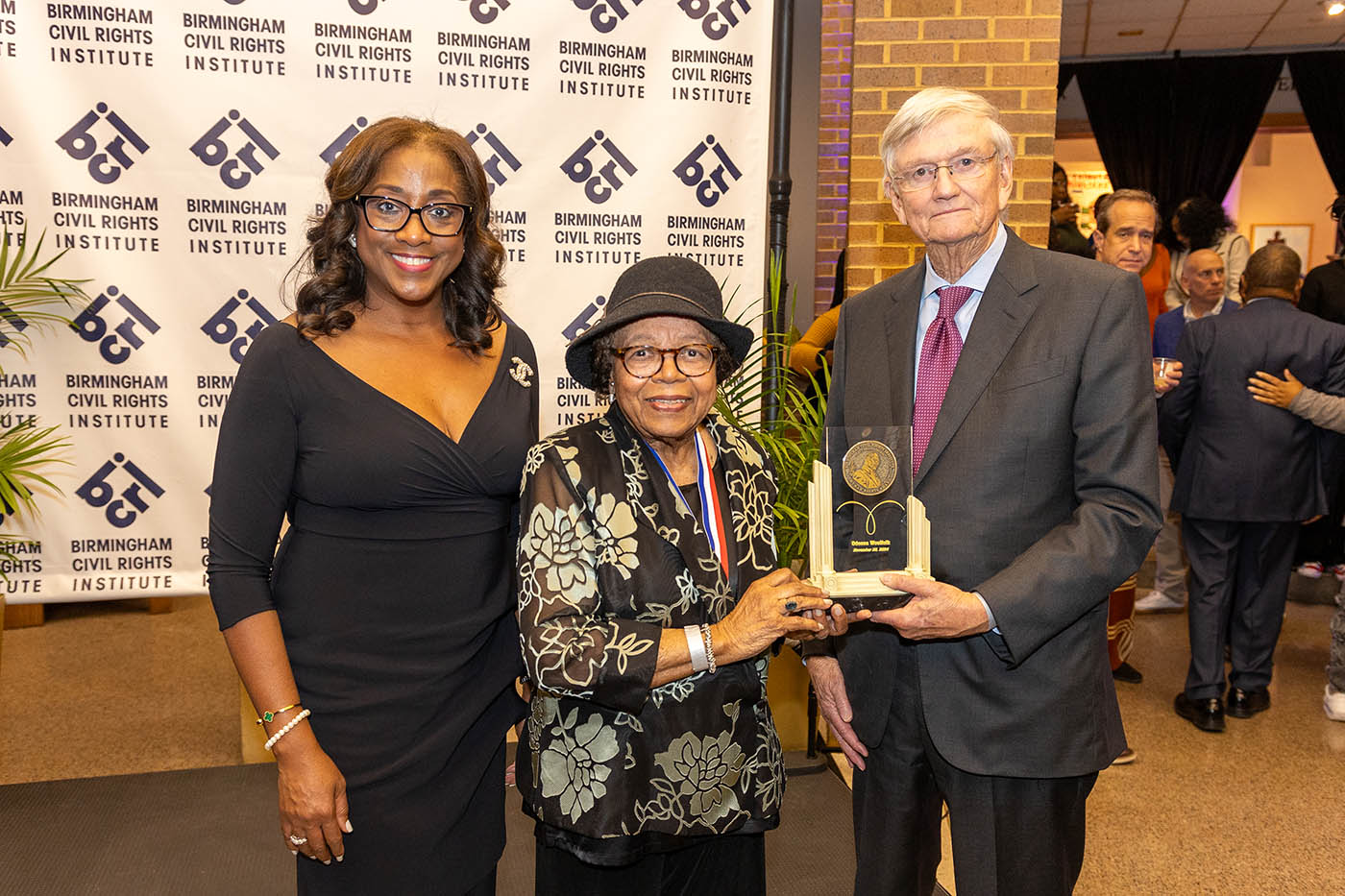
Odessa Woolfolk, center, renowned educator, civic leader and lifelong advocate for Civil and Human Rights and the 2024 Fred L. Shuttlesworth Human Rights Award winner with Rosilyn Houston, Birmingham Civil Rights Institute Board Chair; and Mike Goodwich, (Mike & Gillian Goodrich Foundation) at the Birmingham Civil Rights Institute’s 32nd Anniversary Celebration. (Provided)
The award, named after the legendary civil rights leader and co-founder of the Southern Christian Leadership Conference (SCLC), recognizes individuals who have made enduring contributions to the ongoing fight for equality, justice and human dignity.
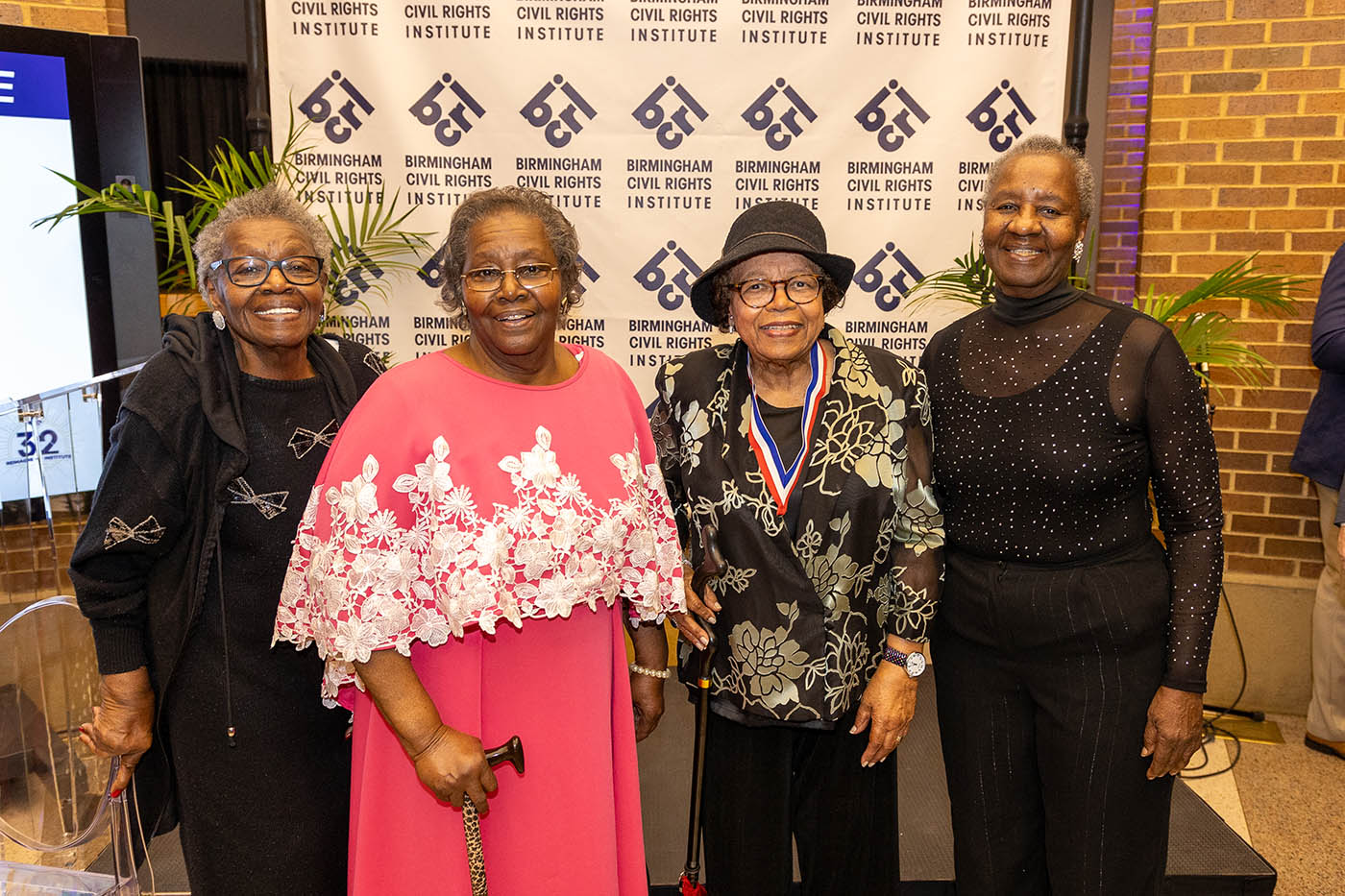
Odessa Woolfolk, center, renowned educator, civic leader and lifelong advocate for Civil and Human Rights and the 2024 Fred L. Shuttlesworth Human Rights Award winner with Rosilyn Houston, Birmingham Civil Rights Institute Board Chair; and Mike Goodwich, (Mike & Gillian Goodrich Foundation) at the Birmingham Civil Rights Institute’s 32nd Anniversary Celebration. (Provided)
“We are honored to present the Fred L. Shuttlesworth Human Rights Award to Odessa Woolfolk, whose lifelong dedication to human and civil rights has shaped the course of history in Birmingham and beyond,” said Rosilyn Houston, newly elected chair of the BCRI Board of Directors, in a statement. “Her vision, leadership and tireless advocacy continue to inspire new generations to stand up for justice and equality. Odessa Woolfolk exemplifies the very essence of what this award stands for.”
#NNPA BlackPress
In the Classroom: How Educators are Teaching Thanksgiving Lessons to the Next Generation
THE AFRO — In real life, the situation was anything but a celebration. According to Holocaust Museum Houston, “when European settlers arrived in the Americas, historians estimate there were over 10 million Native Americans living there. By 1900, their estimated population was under 300,000. Native Americans were subjected to many different forms of violence, all with the intention of destroying the community.”

By DaQuan Lawrence | AFRO International Writer
DLawrence@afro.com
On Nov. 28 the Thanksgiving holiday will arrive, complete with family gatherings, community events and opportunities to give back and be grateful. While conversations about the origin of Thanksgiving and the purpose of the holiday remain suspended between myth and fact-based reality, educators in the state of Maryland grapple each year with how the holiday is addressed in the educational setting.
According to Brittanica, “Thanksgiving is modeled on a 1621 harvest feast shared by the English colonists (Pilgrims) of Plymouth and the Wampanoag people.”
While millions of American citizens use the holiday as the opener to a season of gratitude, for others the holiday is overshadowed by the death and destruction experienced by Native Americans at the hands of Europeans as colonization spread.
According to Dr. Kelli Mosteller, who serves as Citizen Potawatomi Nation’s Cultural Heritage Center director, the holiday “disregards against Native Americans and chooses to take…one tiny snapshot.”
“The world of social media puts pretty filters on it so that it doesn’t look the way it truly did,” she said, in a statement.
In real life, the situation was anything but a celebration. According to Holocaust Museum Houston, “when European settlers arrived in the Americas, historians estimate there were over 10 million Native Americans living there. By 1900, their estimated population was under 300,000. Native Americans were subjected to many different forms of violence, all with the intention of destroying the community.”
Information released by the museum states that “in the late 1800s, blankets from smallpox patients were distributed to Native Americans in order to spread disease. There were several wars, and violence was encouraged; for example, European settlers were paid for each Penobscot person they killed.”
Then came more atrocities.
According to the museum, “In the 19th century, 4,000 Cherokee people died on the Trail of Tears, a forced march from the southern U.S. to Oklahoma.”
The Citizen Potawatomi Nation is the federally recognized government of the Indigenous population and represents over 38,000 tribal members.
Some members of society believe the factual history behind the holiday provides ample reasons for citizens to not celebrate what is billed to the American public as a time to be thankful. To many Native Americans, the holiday ignores over 400 years of mayhem against Indigenous people and maintains the bloody colonialism system responsible for millions of lives lost.
Erica Frank, a social studies teacher specialist in Maryland, expressed concern over the topic of Thanksgiving and highlighted the significance of educational approaches to engage students.
“As a historian and curriculum writer, I struggle with how the narrative of Thanksgiving is relayed,” Frank said. “Like many American historical events, I struggle with the fact that from a young age we condition our students to be compassionate of individuals who created harm towards other cultures that still have reverberating impacts on society today.”
Frank was born and raised in Anne Arundel County, Md. and is currently in her 11th year of education. She remembers learning about the holiday during her own formative years.
“Unfortunately, my experience with Thanksgiving in grade school was more of a teaching in nostalgic American history–rather than accurate American history,” Frank told the AFRO.
“My grade level holiday themed lessons revolved around making turkey and pilgrim crafts to celebrate the coming together of two cultures during one meal. I was not taught about the Wampanoag tribe or the negative impact of Pilgrims– really, colonists– on Native Americans during this time period,” Frank said. “I appreciate that there are a growing number of resources available which discuss the varied perspectives. I have seen growth on the secondary level of both teachers and students asking the right questions about this day and other similar topics.”
Though the origins of the holiday go back to Plymouth, Mass., 1621, President Abraham Lincoln formally established Thanksgiving as a holiday in the U.S. over 200 years later in November 1863 during the Civil War. The holiday was created as a social mechanism to develop improved relations among northern states, southern states and tribal nations.
Unbeknownst to many Americans, is the fact that during the previous year, President Lincoln ordered 38 Dakota tribal members to die from hanging after corrupt federal agents prevented the Dakota-Sioux from receiving food and provisions. Members of the tribe retaliated while enduring starvation, causing the Dakota War of 1862.
Lincoln ultimately believed that Thanksgiving created an opportunity to reduce Indigenous populations’ negative sentiments and to restore their relationship with the federal government.
But the loyalty to the holiday runs deep- especially in the classroom, where Thanksgiving is formally introduced during the elementary school years, amid a student’s formative development period.
“I remember as far back as kindergarten, when teachers had us play the roles of pilgrims and Native Americans,” said Erica Sellman, an English Language Arts department chair at a middle school in Anne Arundel County. “They separated the class, and the Pilgrim group created a ship while the Native American group created beautiful head pieces from feathers. I recall being upset because I wanted to make a head piece, but I was not in that group.”
Voter registration for young Black women in 13 key states is on the rise, with 175 percent more engagement when compared with 2020 — nearly triple the rate. The surge highlights long standing political engagement within this demographic. (Photo courtesy of Word In Black)
The decision of whether to discuss the history of the Thanksgiving holiday in an in-depth manner is largely a matter of an educator’s discretion and dependent upon the educator’s experience and comfortability by addressing the subject with young learners.
“History should be a part of instruction– however, all educators cannot teach sensitive topics without biases,” Sellman said. “It is hard for some educators regardless of ethnicity to discuss some of the context behind historical events, but it can be done, and it should be done.”
Rutgers University’s Graduate School of Education provides resources for educators who are interested in teaching about the Thanksgiving holiday in a culturally responsive manner. Their guide, titled “Teaching Thanksgiving the Culturally Responsive Way,” notes how teachers need to start by deconstructing myths surrounding the holiday.
Experts from Rutgers say myths such as “the arrival of The Mayflower was the introduction between the Pilgrims and Native Americans,” need to be addressed, explored and corrected.
“Europeans had already initiated contact with the Wampanoag tribe through violent slave raiding. When The Mayflower arrived, there were at least two Wampanoag tribe members that spoke English, due to traveling to Europe and back,” states information from Rutgers University’s guide.
The university explains how the myth of “the Wampanoag tribe wanted to help the Pilgrims” is also wrong because “Wampanoag leader Ousamequin chose to welcome the Pilgrims as a strategy. At the time, his tribe was weak and had lower numbers due to coming in contact with disease. He thought an alliance would help strengthen the tribe and protect against rivals.”
Even the Thanksgiving dinner between the Pilgrims and the Native Americans is steeped in incorrect information, according to the university.
“Annual harvests are a tradition in Native American communities, and the Wampanoag’s annual harvest is what the Pilgrims experienced. In reality, a loose version of Thanksgiving was established in 1637 by Massachusetts Bay Governor William Bradford,” report historians from Rutgers. “Instead of commemorating a shared feast, the observance celebrated the Anglo-Pequot War, where armed soldiers surrounded the Pequot village and set it on fire, shooting anyone who tried to escape. During the two-year war, 700 Pequot people were killed or enslaved, with the tribe eventually being eliminated.”
The guide encourages culturally responsive teaching when it comes to the sensitive topic of Thanksgiving in the classroom.
In 2020, the National Education Association took note of Native educators who declared that lessons on the subject and holiday can be both accurate, respectful and interesting to learn about with an element of commemoration.
-

 Activism3 weeks ago
Activism3 weeks agoLIVE! — TOWN HALL ON RACISM AND ITS IMPACT — THURS. 11.14.24 5PM PST
-

 Bay Area4 weeks ago
Bay Area4 weeks agoOakland Mayor Sheng Thao’s Open Letter to Philip Dreyfuss, Recall Election’s Primary Funder
-
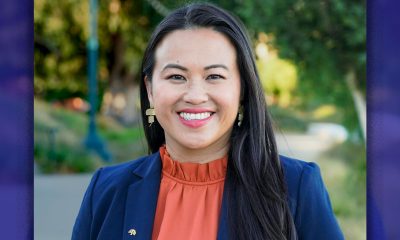
 Bay Area4 weeks ago
Bay Area4 weeks agoOakland Awarded $28 Million Grant from Governor Newsom to Sustain Long-Term Solutions Addressing Homelessness
-
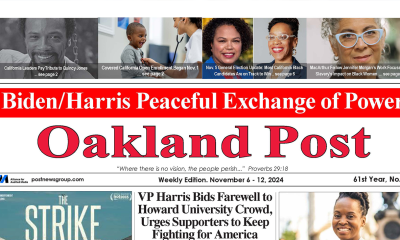
 Activism4 weeks ago
Activism4 weeks agoOakland Post: Week of November 6 – 12, 2024
-

 Bay Area4 weeks ago
Bay Area4 weeks agoPamela Price Appoints Deputy D.A. Jennifer Kassan as New Director of Community Support Bureau
-

 #NNPA BlackPress4 weeks ago
#NNPA BlackPress4 weeks agoOP-ED: The Illusion of Allyship. White Women, Your Yard Signs Mean Nothing to Me
-

 Activism2 weeks ago
Activism2 weeks agoAn Inside Look into How San Francisco Analyzes Homeless Encampments
-

 #NNPA BlackPress2 weeks ago
#NNPA BlackPress2 weeks agoPRESS ROOM: Clyburn, Pressley, Scanlon, Colleagues Urge Biden to Use Clemency Power to Address Mass Incarceration Before Leaving Office




